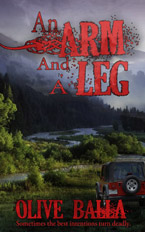by Olive Balla
 This past week I was whining to a friend about the query-and-wait-query-again-wait-again process. I complained that at my age, the length of time involved in that whole thing is a real issue. According to my high school website, classmates are dropping like flies, and I’d like to leave something for my progeny to remember me by, blah, blah, blah. My friend commiserated with me, as good friends will. And then she said something that took me by surprise. She said, “You’ve heard all your life what a good writer you are. Is it possible that a tiny bit of entitled arrogance has plugged the pipes of your learning curve?”
This past week I was whining to a friend about the query-and-wait-query-again-wait-again process. I complained that at my age, the length of time involved in that whole thing is a real issue. According to my high school website, classmates are dropping like flies, and I’d like to leave something for my progeny to remember me by, blah, blah, blah. My friend commiserated with me, as good friends will. And then she said something that took me by surprise. She said, “You’ve heard all your life what a good writer you are. Is it possible that a tiny bit of entitled arrogance has plugged the pipes of your learning curve?”
Arrogant? Moi? But a no-holds-barred introspection revealed a sad smidgen of truth in my friend’s words. I do indeed carry around my own ash-filled urn of what I call Unfulfilled Expectations (UE). And I’m fairly certain that I’m not the only writer suffering from this condition.
Here’s how UE works:
Beginning when you were about the age of ten, your friends asked you to tell ghost stories at all the sleepovers. Your extemporaneous flights of fantasy wowed them, and catapulted you to the top of the “A List” for elementary school parties.
Ditto middle school.
When you got to high school, your English teachers consistently wrote “Excellent” at the top of your reports. One even gushed over your artistic imagery and suggested you sign up for the journalism class.
When you got to college, at least one professor commented on the superior quality of your essays. Perhaps he even suggested you take some classes in creative writing.
Over the subsequent years, friends and family members said you were destined to make a name for yourself. Some even jokingly admonished you to remember your roots once you become rich and famous (Except for your Dad, who told you to get a real job).
You did get a real job, but you continued to write on the side, biding your time, savoring the taste of certain, eventual success.
By the time you reached adulthood, you had been sautéing in the honeyed warmth of kudos and gold stars for a couple of decades. Timing seemed to be right, and you came up with a great idea for a novel.
The completion of that first novel was hailed by friends and family as a ground-breaking event. Accolades flew like dust in Oklahoma. You smugly submitted a query to a few agents.
Your first salvo of rejections dented your kudos-softened exterior. But you were pleased to learn that even Rowling’s first Harry Potter novel was rejected by big-name publishers before being reluctantly picked up. You decided to persevere.
With the passing of a couple of years, and after a few more rejections, you began to question your desire to write. Your dad said perhaps you should stick with your day job. What used to be the glistening promise of authorial success became lodged in your throat as a bitter I-can’t-believe-no-one-recognizes-my-talent pill.
But cheer up. That doesn’t have to be the way your struggle for publication ends. It does appear, however, that the question might not be whether or not you want to become a published author, but how badly you want it.
Literary agent Rachelle Gardner, one of my favorite bloggers, suggests there are hoards of gifted writers who can’t be bothered to learn writing basics, or about the world of publication. These are writers who are unwilling to spend the time and energy necessary to make it in today’s market. I suspect their numbers include scores of those who as elementary students were given gold stars for no particular reason, thereby learning that success comes with minimal effort.
It’s not that there is anything wrong with self-awareness, or with recognizing one’s potential. Real self-confidence is a good thing. It provides an inner strength that carries us through the invariable tough times life brings.
But as my still-best-friend hinted, the other side of that coin may be a sense of entitlement that serves as a crutch, as an excuse to avoid the hard work required to make the most of those talents. The problem with arrogance is that it makes us lazy.
Those of us who are determined to get published must be willing to do the things required to make it happen. We must go back to the beginning. We must not only learn the craft from the basics up, but we must learn all we can about The Industry. And, of course, we must never give up.
 Olive Balla, author of suspense novel An Arm and a Leg, is mother of 3, grandmother to 13, great-grandmother of 4, a retired educator, and part-time professional musician. Having been everything from secretary at a used car dealership, a university student, and a high school Spanish teacher, Balla states her characters are, in part, amalgamations of people she’s met. Living with her husband Victor in the Albuquerque area, she spends her spare time in a small woodworking shop designing and building everything from breadboxes and wine racks, to a porch bench. Visit her website at omballa.com.
Olive Balla, author of suspense novel An Arm and a Leg, is mother of 3, grandmother to 13, great-grandmother of 4, a retired educator, and part-time professional musician. Having been everything from secretary at a used car dealership, a university student, and a high school Spanish teacher, Balla states her characters are, in part, amalgamations of people she’s met. Living with her husband Victor in the Albuquerque area, she spends her spare time in a small woodworking shop designing and building everything from breadboxes and wine racks, to a porch bench. Visit her website at omballa.com.
This article was originally published in the April 2013 issue of SouthWest Sage and is reprinted here by permission of the author.


























Leave a Reply